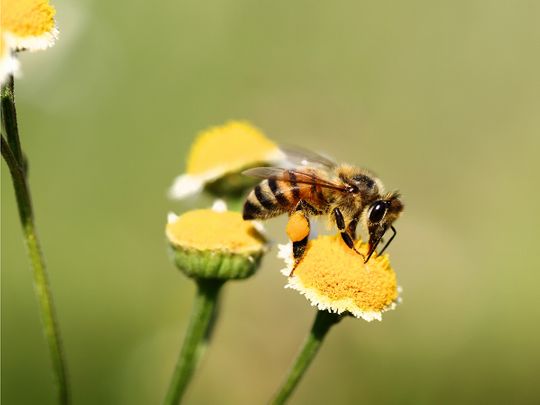
For every person on the planet, there are 1.4 billion insects – and we need nearly every one of them.
Click start to play today’s Spell It, where you can spot ‘bees’, the pollinators of the world.
Most of us regard insects as annoying critters that sting us or spoil our picnics. But they’re the invisible force that’s keeping the world running. In the 2017 natural science book Bugged, American author David MacNeal called them the lever pullers of the world, providing crucial services like returning nutrients to the earth and pollinating our crops.
In fact, in an April 2006 study published in the journal BioScience, entomologists from US-based Cornell University found that insects contribute services worth $57 billion (Dh209 billion) in the US – and that’s not including pollination. Most of their figures were based on wildlife insects that exist at the bottom of the food chain, keeping fish, birds, and mammals alive. The researchers later estimated that insects responsible for pest control would add another half a billion dollars and admitted that there’s no way to account for how much it would cost to decompose plant life or dead bodies.
Insects don’t just quietly keep the cogs of the world moving. According to an August 2017 report in the National Geographic, they’re an important source of food, too. About 2,086 species of insects are eaten by 3,071 ethnic groups in 130 countries.
In Mexico, chapulines (grasshoppers) are sold in brown paper bags, coated with spices. In Africa, caterpillars are popular since they provide an excellent source of zinc, calcium, iron, and potassium. Wasp larvae are common in Japan and resemble white raisins. Rice bugs in Borneo are cooked in bamboo stems, with chilli and salt, and in the Italian and French islands of Sardinia and Corsica, people eat casu martzu, a maggot-infested sheep milk cheese that’s considered to be a delicacy.
And long before humans developed a taste for insects, we were using them in medicine. Freshwater leeches, for instance, were used to suck blood from the surface of the skin, to improve blood flow. The US Food and Drug Administration (FDA) still allows their use to relieve congested veins and restore blood flow in reconstructive surgery.
In an even more revolutionary process, biologists are extracting venom from deathstalker scorpions in Australia and the US, and using it as ‘tumour paint’, according to an October 2016 report in the US-based Smithsonian Magazine. The venom attaches to tumours like a magnet, and when paired with fluorescents, doctors can see the tumours light up in the brain during brain surgery – a cutting-edge development that can help surgeons see exactly where they need to cut.
The world’s insects, however, are in trouble. Colony collapse disorder (CCD), for instance, which is a phenomenon where most worker bees in a colony disappear and leave behind a queen, impacted the global bee population dramatically, in the early 2000s. Insect extinction is also one of the most extensive extinctions on the planet, according to Bugged.
Is it time to pay attention to the world’s tiniest critters? Bugged author MacNeal predicts in his book that if all human beings were to go extinct tomorrow, nothing much would happen to the planet. But insect extinction could be cataclysmic.
What do you think of the importance of insects? Play today’s Spell It and tell us at games@gulfnews.com.





